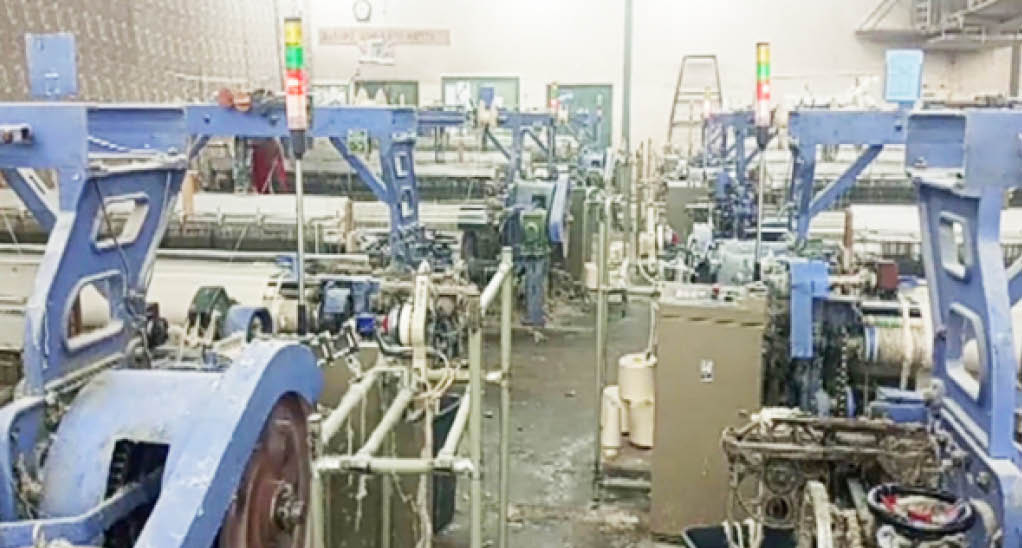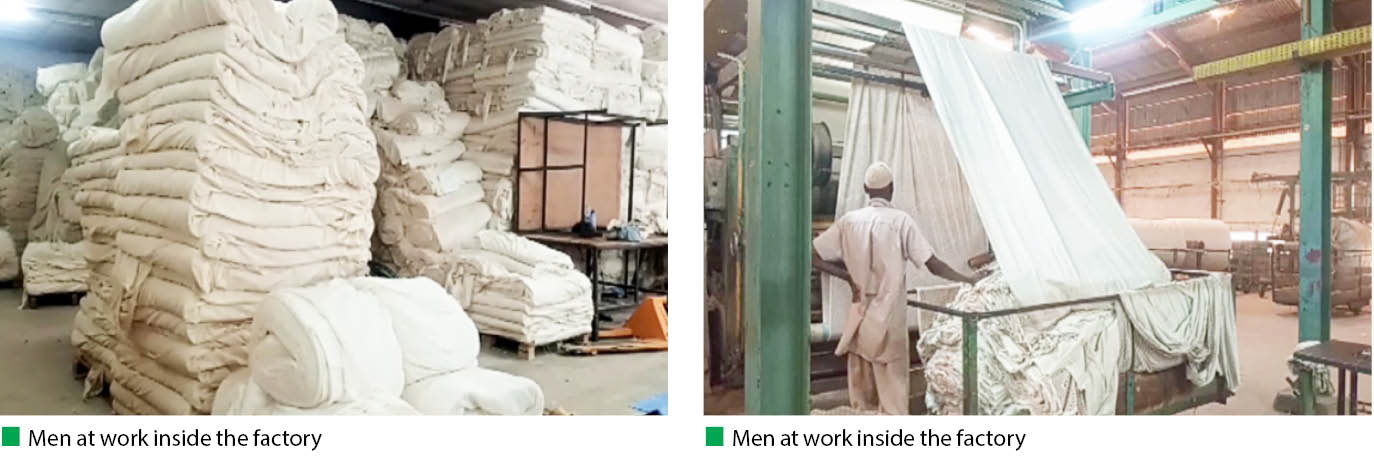Spotlight on a surviving textile factory in northern Nigeria
As harsh economic condition continues to take toll on Nigerians, only few textile industries remain afloat, but may be forced to fold up if nothing is done to salvage the sector from impending collapse. Textile industries in Nigeria have been battling to survive the difficult business environment occasioned by fuel subsidy removal, rising inflation and […]

machines inside funtua textile
As harsh economic condition continues to take toll on Nigerians, only few textile industries remain afloat, but may be forced to fold up if nothing is done to salvage the sector from impending collapse.
Textile industries in Nigeria have been battling to survive the difficult business environment occasioned by fuel subsidy removal, rising inflation and the foreign exchange crisis, with a devastating effect on the value of the naira. The naira exchanged for N1,500 against the US dollar last at the parallel market.
The Funtua Textile Industry is one of the few firms struggling to withstand the pressures despite the fact that the chances of its surviving the economic turbulence in the country are minimal, with possibilities of things getting worse in the future unless drastic measures are put in place to arrest the situation.
A visit to the company’s plant at Dukke village, few kilometers away from the Funtua-Gusau road in Funtua Local Government Area of Katsina State, shows that though the industry is functioning fully, the fear of the unknown is glaringly showing on the faces of many of its workforce; and the reason is simple.
The chances of surviving the epileptic power supply, high cost of raw materials, occasioned by high inflation and rising exchange rate, as well as inconsistent government’s policies, seem to be pushing the Funtua Textile Industry to the brink.
The director, Human Resource/Personnel Department of the industry, İbrahim Mu’azu İsa, said the firm was facing multiple challenges, which he attributed to several factors that require holistic approach and commitment to address by the government and other stakeholders to achieve the desired objective.
“The challenges are just too numerous to mention. We want the government to reintroduce the cotton board to regulate the sector from its current situation, revive cotton production, which is comatose at the moment, then provide interest-free loans to textile industries to enable them operate optimally,” Muazu said.
According to him, when that is done, “The government needs to think towards improving the power sector, vis-a-vis reduce the price of LPFO, which is the fuel we use to power our generators for effective and efficient production.”

The interesting thing is that the Funtua Textile Industry has never for once stopped production since its establishment in 1978, an indication that the firm is succeeding where several others have failed. This success is premised on the company’s ability to leverage on its available resources to survive, but like many other industries in Nigeria, it is currently struggling to strike a balance.
The mill runs variety of services, comprising ginnery, spinning, weaving and finishing facilities, besides engaging in the production of cotton blended goods, bed-sheets, pillow cases and polyester, among others.
The Funtua Textile plant is sustaining its 1.2million yards per month capacity, defying the monster of insecurity, inadequate funding and harsh economic realities.
Although the industry was known for producing goods for export to countries like America and other countries, as well as for local consumption, it now relies heavily on local consumers to patronise its products and services.
However, despite all efforts to strike a balance between where it aimed to be and the harsh economic realities, the firm has 650 staff from 3,500 it used to have few years ago, although reassuring that it neither plans to close down nor downsize its workforce no matter the difficulty.
The Director of Human Resource/Personnel, İbrahim İsa, said the staff of this industry sat down and resolved to contribute money every month to support orphans and assist the needy in the society as one of secrets behind the breakthrough of the company.
“As part of our corporate social responsibility we also construct schools, hospitals and support farmers with inputs in our host communities,” the director said.
Funtua Textile Industry, however, commended the Governor Dikko Umar Radda-led administration in Katsina for summoning a stakeholders meeting with the aim of revolutionising cotton production in the state, which is the largest producer in Nigeria.
Muazu said, “The governor showed his commitment to rescue the sector during our interactive session with him recently. And we believed him with all seriousness as an expert to the core. At the moment, we are at the sensitisation level to educate farmers on cotton production.”
“If you go to the ginning section you would see how cotton from farmers is wet, mixed with sand and stones, just to make it higher than the normal weight; and this is not healthy to our machines, and at the end, the seeds will spoil. And it is the same thing that will go back to farmers for planting. This is why we are where we are today – lagging behind in production.”
Speaking on the impact of the company, the Sarkın Maskan Katsina and district head of Funtua, Alhaji Sambo İdris Sambo urged farmers and agro-allied industries to be sincere and committed to government’s policies, aimed at rejuvenating cotton production in Katsina State.
The Sarkın Maska said, “Our major concern is that in most cases, agro-allied industries supply inputs to farmers on loan, to repay at the end of the season, but mostly, they either end in courts or here with us for reconciliations due to insincerity from farmers. This is a very bad habit, which led to the decline in cotton production, which needs to be reversed.”
Funtua zone is an agrarian community where cotton was produced in large quantities. Because of this, all efforts would be geared towards feeding Funtua Textile with required raw materials to continue to meet local markets demand and even for export, the Sarkın Maska assured.
A cross section of cotton dealers in the Funtua area commended the giant stride of the textile industry, promising to work closely with other relevant authorities to revive the sector.
“We have a responsibility to cooperate with the government to do the needful,” A cotton dealer Alaramma Ibrahim Muhammad said.
In most parts of Katsina, residents acknowledged the availability and affordability of textile materials from Funtua Textile locally, known as Dan Funtua. But the availability is, however, not without some challenges.
Mudassir Lawal, a businessman dealing in textile materials in Funtua, who acknowledged the availability and affordability of fabrics from the industry, said one needed to travel elsewhere to get the products.
“We have to travel to Kano to purchase products of Funtua Textile instead of buying it here. I think this is not good,” he said.
The traders also called on the management of the company to device a means through which they can get the materials directly, saying that would go a long way in reducing the cost and risk of travelling to Kano.
Although at the moment, the textile firm sources its raw materials, especially cotton, from Katsina, Gömbe and Jigawa states, experts recommended the revival of cotton board in the country to regulate the market and ensure quality control.
The common problems textile companies are facing in Nigeria include insufficient raw materials, smuggling of foreign textile, shortage or lack of stable electricity, rising cost of diesel and spare parts for industrial machines. How Funtua Textile managed to overcome these problems is seen as mystery by industry watchers.
